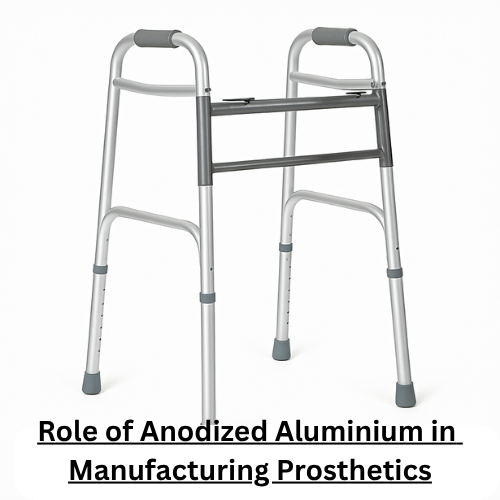The global healthcare and medical devices industry is witnessing a technological transformation — and the prosthetics sector is no exception. Modern artificial limbs are no longer just functional; they are designed to be durable, lightweight, and increasingly comfortable. One of the unsung heroes behind this progress is anodized aluminium.
Anodizing has proven to be a game-changer in the field of prosthetics manufacturing, offering a host of advantages that cater to both performance and patient comfort. This blog explores the applications, benefits, and growing relevance of anodized aluminium in the prosthetics industry.
What Is Anodizing and Why Aluminium?
Anodizing is an electrochemical process that enhances the natural oxide layer on aluminium. This layer becomes thicker, more durable, and resistant to corrosion, wear, and chemical damage. When aluminium is anodized, it retains its lightweight nature while gaining additional surface strength and functionality — a critical combination for prosthetic limbs.
Aluminium, already known for its strength-to-weight ratio, becomes even more versatile through anodizing. This makes it especially valuable in creating components for prosthetic legs, arms, and joint systems.
Applications of Anodized Aluminium in Prosthetics
- Structural Frames and Connectors
The skeletal framework of many prosthetic limbs is built using aluminium due to its light weight and high strength. When anodized, these parts resist environmental wear and provide long-term durability even with daily use. - Socket Components
The socket, which connects the limb to the user’s body, requires materials that are both strong and biocompatible. Anodized aluminium resists sweat, moisture, and skin oils, making it ideal for prolonged skin contact. - Joint Mechanisms
Knee, ankle, and elbow joints in advanced prosthetics require precise, corrosion-resistant mechanisms. Anodized surfaces help ensure smooth mechanical operation with minimal friction and wear over time. - External Finishes and Cosmetic Covers
Anodizing can be customized in various colors and finishes, allowing manufacturers to offer cosmetic personalization — an important factor in user satisfaction and confidence.
Key Benefits of Using Anodized Aluminium in Prosthetics
1. Lightweight Comfort
Comfort is a top priority in prosthetics. Aluminium is already light, but anodized aluminium retains this benefit while adding surface durability — making prosthetic limbs easier to wear for long durations without fatigue.
2. Enhanced Corrosion Resistance
Sweat, water, and humidity are daily challenges for prosthetic users. The anodized layer provides a non-reactive barrier that prevents rust or chemical degradation, especially in humid and tropical climates.
3. Long-Term Durability
Prosthetics are subjected to frequent motion, pressure, and impact. Anodizing adds a wear-resistant finish that ensures components can withstand years of daily use without cracking, peeling, or deteriorating.
4. Skin-Friendly and Biocompatible
Biocompatibility is critical in medical-grade applications. Anodized aluminium is hypoallergenic and safe for direct or extended contact with human skin, reducing irritation or allergic reactions.
5. Easy Maintenance
Anodized surfaces are easier to clean and maintain. Dirt, grease, and bacteria do not easily adhere to the smooth, treated surface, which is essential for maintaining hygiene in healthcare settings.
6. Aesthetic Customization
Anodizing offers a range of finishes and colors, giving prosthetic wearers the ability to personalize their limbs. This is particularly important for boosting user morale and self-confidence.
7. Sustainability & Recyclability
Aluminium is 100% recyclable, and anodizing is an environmentally friendly process. The growing focus on sustainable medical manufacturing makes anodized aluminium an attractive choice for eco-conscious producers.
Real-World Relevance and Market Trends
The prosthetics market is shifting toward smart limbs and high-performance adaptive devices. As these innovations demand lighter and stronger materials, anodized aluminium is proving essential.
Global data shows that more than 90% of advanced mechanical prosthetic components use some form of anodized metal due to its strength, resilience, and performance under repeated motion. As the population ages and accidents become more frequent in urban environments, the demand for robust, lightweight, and customizable prosthetics is surging.
The Growing Role of Anodizing Experts
It’s worth noting that advanced anodizing solutions tailored for medical and healthcare industries play a vital role in delivering performance-grade prosthetic components.
Providers offering eco-friendly anodizing processes and specialized chemical formulations ensure the final product is safe, long-lasting, and meets international quality standards for medical devices.
Final Thoughts
Anodized aluminium is a crucial enabler of modern medical innovations. In the world of prosthetics, where functionality and comfort are imperative, anodizing has helped push the boundaries of what’s possible.
Its strength, lightness, resistance to wear, and skin-safe properties make it the ideal material for crafting high-performance artificial limbs. As healthcare technology evolves and the need for durable, customizable, and sustainable prosthetics grows, anodized aluminium will continue to lead the charge.
Frequently Asked Questions – FAQs
1. How can I get in touch with your team for Anodizing requirements?
You can contact us directly by emailing corporatecommunications@growel.com. Our team will be happy to assist you with your specific requirements, technical questions, or service inquiries.
2. Is there any inquiry form that I need to fill out?
Please visit our Anodizing Solutions page. Scroll to the bottom of the page — you’ll find a simple inquiry form there. Kindly fill it out, and our team will contact you shortly to assist with your requirements.
3. Is there a support email if I have questions about the website or technical issues?
Yes! For any queries related to Anodizing, please reach out to corporatecommunications@growel.com. We’ll ensure your query is resolved promptly.



